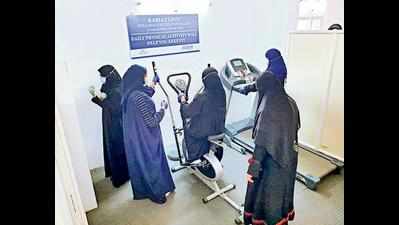- News
- City News
- Hyderabad News
- First in Telangana: Hyderabad mosque opens gym for women
Trending
This story is from January 22, 2021
First in Telangana: Hyderabad mosque opens gym for women
A mosque at Rajendranagar has set up a wellness centre with a gymnasium for women residing in the nearby slums. This is the first time in the state that a mosque has facilitated a gym for women with an expert trainer.

Women working out in a section of the gym in Rajendranagar
HYDERABAD: A mosque at Rajendranagar has set up a wellness centre with a gymnasium for women residing in the nearby slums. This is the first time in the state that a mosque has facilitated a gym for women with an expert trainer.
The aim behind the gym and wellness centre is to reduce the incidence of non-communicable diseases in women living in the slum areas.
A professional woman trainer has been hired to train women in physical exercises, in two sessions daily. It has also health counsellors and a physician.
The gym at Masjid-e-Mustafa located in Wadi-e-Mahmood in Rajendranagar is funded by SEED, a US-based NGO. Helping Hand Foundation (HHF), a city-based NGO, is coordinating with the mosque committee in running the wellness centre.
During the survey, women with high risk of non-communicable diseases (NCDs), mainly with body mass index (BMI) greater than 25 and those with morbid conditions, were identified for the purpose of being trained at the gym. “The key components of the NCD programme at the mosque clinic-cum-gym are risk assessment, counselling on diet and exercise and screening for renal, liver and eye issues. Trained and professional counsellors are part of the clinic,” said HHF managing trustee Mujtaba Hasan Askari.
The survey also revealed that women with polycystic ovarian disease (PCOD) constitute about 30% of the participants.
Women between 25 and 55 years were screened as part of the survey. About 12% had single or comorbidities like diabetes, hypertension and thyroid problems. All women (20-49 years and above) had a BMI more than 25 (obesity).
Mujtaba said 52% of women had high hip-waist ratio more than 0.8, which predisposes the women to the risk of cardiometabolic syndrome, which is now classified as a cluster of dysfunctions like insulin resistance, tolerance and de-arranged lipids that lead to the risk of diabetes, hypertension and cardiovascular diseases.
The aim behind the gym and wellness centre is to reduce the incidence of non-communicable diseases in women living in the slum areas.
A professional woman trainer has been hired to train women in physical exercises, in two sessions daily. It has also health counsellors and a physician.
The gym at Masjid-e-Mustafa located in Wadi-e-Mahmood in Rajendranagar is funded by SEED, a US-based NGO. Helping Hand Foundation (HHF), a city-based NGO, is coordinating with the mosque committee in running the wellness centre.
The gym follows a survey conducted in the slums of Old City which revealed that 52% women are at risk of cardiometabolic syndrome.
During the survey, women with high risk of non-communicable diseases (NCDs), mainly with body mass index (BMI) greater than 25 and those with morbid conditions, were identified for the purpose of being trained at the gym. “The key components of the NCD programme at the mosque clinic-cum-gym are risk assessment, counselling on diet and exercise and screening for renal, liver and eye issues. Trained and professional counsellors are part of the clinic,” said HHF managing trustee Mujtaba Hasan Askari.
The survey also revealed that women with polycystic ovarian disease (PCOD) constitute about 30% of the participants.
Women between 25 and 55 years were screened as part of the survey. About 12% had single or comorbidities like diabetes, hypertension and thyroid problems. All women (20-49 years and above) had a BMI more than 25 (obesity).
Mujtaba said 52% of women had high hip-waist ratio more than 0.8, which predisposes the women to the risk of cardiometabolic syndrome, which is now classified as a cluster of dysfunctions like insulin resistance, tolerance and de-arranged lipids that lead to the risk of diabetes, hypertension and cardiovascular diseases.
End of Article
FOLLOW US ON SOCIAL MEDIA











